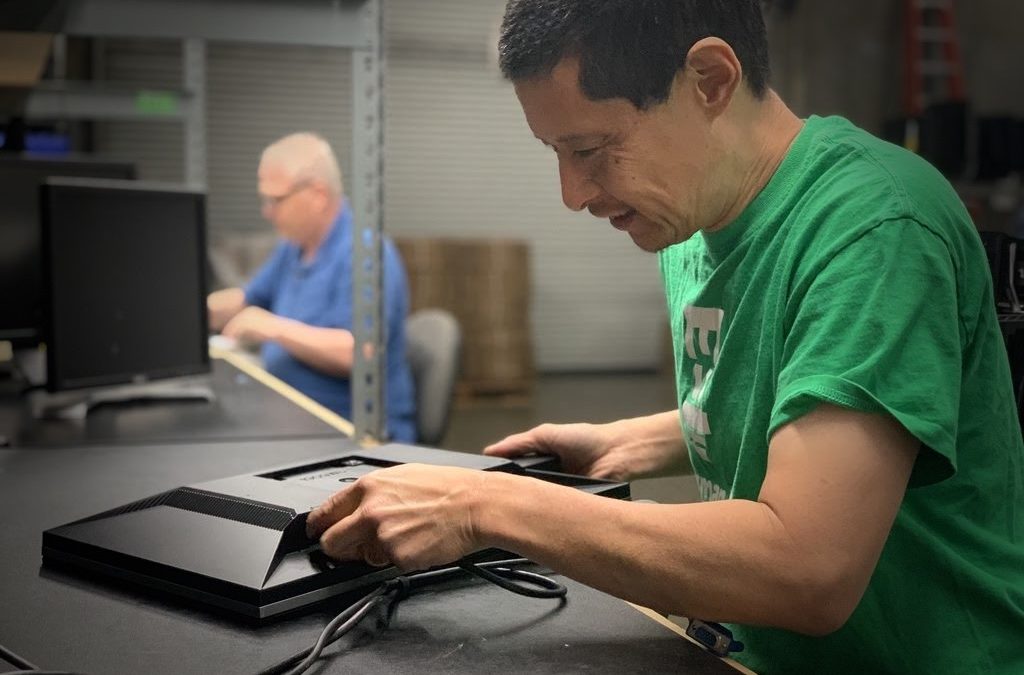Amongst its far-reaching effects, the coronavirus pandemic of 2020 illuminated another as-yet-unsolved plague on American society: the yawning economic and educational chasm perpetuated by the “digital divides” across access to high speed internet, connected devices, and digital literacy. Put differently: many of our greatest problems, while newly exacerbated by COVID-19, can be traced to the same root cause–digital inequity.
Amongst our nation’s largest cities, Detroit has felt the brunt of COVID-19’s impact most severely. According to a 2015 report cited by the FCC, approximately 40% of homes in the City of Detroit lack home internet. As a result, according to the Detroit Public School District, a large percentage of K-12 students could not consistently access their schoolwork from home during the COVID-19 pandemic. While philanthropy has worked to rectify this since 2009, a budding public-private partnership is now building on those in-progress efforts with a stated goal of bridging the digital divide for its residents––once and for all.
The state of digital inequity in Detroit–both pre- and post-pandemic––is not unique. Like many historical and systemic inequities, its digital divides disproportionately impact poor people of color. However, for shining a brighter spotlight on this issue, COVID-19 has seen more public-private partnerships blossoming and receiving investment in cities nationwide. Chicago, San Jose, Oakland and Los Angeles, to name a few, have built formidable coalitions of governmental, private and philanthropic actors dedicated to alleviating digital equity––faster and together.
In August, the Michelson 20MM Foundation launched Connecting California, a virtual series that aims to increase awareness of the impacts of digital inequity and explore case studies of proven solutions from in-state and around the country. Joshua Edmonds, the city’s first ever Director of Digital Inclusion joined 20MM earlier this month to talk about the work underway in Detroit. As an alum of President Obama’s ConnectHome initiative — a partnership among communities, the private sector and federal government to expand high speed broadband to more families across the country — Joshua is uniquely positioned to help Detroit succeed.
We’re excited to dig deeper and spotlight the work taking place in Detroit to contribute to our learning community.
Detroit Initiative to Close the Digital Divide
In April of this year, Detroit launched a $23 million initiative focused on solving the digital divides for the entirety of the city’s 51,000 public school students. Their target: providing connected devices and internet access for all Detroit families within the 2020-21 academic year.
A diverse cross-sectoral coalition of partners spearheading the effort includes DTE Energy Company, the Skillman Foundation, Quicken Loans, the Detroit Mayor’s Office, the Detroit school district, and human I-T. City of Detroit Digital Inclusion Director Joshua Edmonds is tasked with solving the divide by developing comprehensive strategies to expand access for Detroiters.
“When people ask what we are doing in Detroit,” Edmonds noted, “the answer is simple. We’re building an operation that exists at the intersection of technology and opportunity. This initiative, Connect 313, is intentionally built to funnel new resources into our local ecosystem that activate bold, innovative partnerships to address and bridge multiple digital divides.”
Detroit’s private sector partner, Quicken Loans, was on the ground floor of Connect 313, which is using data-driven, community-first methodologies. Through additional contributions from Rocket Mortgage and other private sector partners, Connect 313 makes investments based on four strategic goals: building neighborhood technology hubs, collecting real-time data on internet access, empowering residents to become digital literacy ambassadors, and coordinating city-wide fundraising and public advocacy.
“The COVID-19 pandemic shone a bright spotlight on an issue that has been a long-time challenge for Detroit,” added Jayme Danzig, Quicken Loans’ Director of Education and Employment. “We knew [this investment] could serve as a driver of lasting change and are honored to have played a role in developing Connect 313, which [we designed to] support the community’s efforts . . . with a cohesive, data-driven plan.”
Non-profit actors play a critical role in directly engaging students and families by providing information about low-cost internet access, tech support, and digital literacy. Detroit’s non-profit partner human-I-T is providing tech support to the entire Detroit Public Schools Community District (DPSCD), at no cost to recipients. They are also providing assistance to Detroit households in signing up for low-cost internet plans, ensuring households have options that allow them to maintain an internet connection in the home after their six months of subsidized service has ended.
Outside of Connect 313, human-I-T serves as a digital inclusion practitioner for the entire City of Detroit. They help families connect to free or low-cost computing devices, assistance signing up low-cost internet, and digital literacy training. Through their refurbishment model, they partner with businesses to take in unwanted technology (often dubbed “e-waste”) and refurbish it to distribute back out to the community.
“We are incredibly grateful to have found such a dedicated and welcoming digital inclusion community in Detroit” remarked Director of Impact & Sustainability, Allie Bussjaeger. “Bridging the digital divide truly is a collaborative effort. I am so proud of the impact we have had in the Detroit community through the Connect 313 initiatives, working alongside Josh, Rocket Mortgage Quicken Loans, and many more entities from both the public and private sector.”
Stay Engaged! Tune into Our Digital Learning Series
The Michelson 20MM Connecting California: Solving the Digital Divide learning series highlights insights from business leaders, digital equity practitioners, internet service providers, philanthropic investors and policymakers—all representing different facets of the complex landscape around building equitable solutions to the digital divide at national, state and local levels. It’s inaugural event, co-hosted by the office of Governor Gavin Newsom in service of advancing digital equity for all CA students and families, and other events can be accessed on our YouTube Channel.
We invite those interested in future events and updates to sign up here! We hope you’ll join our Connecting California LinkedIn group, a dedicated space to foster collaboration to advance digital equity and close the divide––faster, and together.

